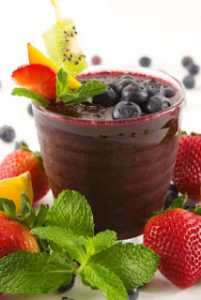
Nutritionists recommend consuming fresh fruits and vegetables every day because they are rich in vitamins and minerals necessary for the correct reactions of our body. Cooking methods tend to destroy vitamins that are very fragile and particularly sensitive to heat such as vitamin C.
Eaten raw, fruits and vegetables retain all their properties and their micronutrients intake, certainly not energy valued but essential to life. Juices and smoothies are a delicious way to meet this need. Their different nature gives them different nutritional properties. So which one to choose?
Fruit and vegetable juices have existed for a very long time and humans are not alone in appreciating them: primates with grips are also able to squeeze oranges and extract juice from other fruits. Besides their pleasant taste, their major property is to be more assimilable by the body. Indeed, they are extracted from pressed fruit and vegetables, which results in a direct absorbable liquid substance, containing in particular water, minerals and vitamins without the dietary fibers -poorly digestible- found in the pulp for example. Digestion of juices is therefore almost instantaneous and requires little energy. This means that they provide a rapid intake of nutrients and micronutrients. The presence of fibers forces the digestive system to “work” more to gain access to the elements: the contact time between vitamins / minerals and the digestive mucosa is slowed because the fibers accelerate the transit. However, fibers are not just a “net” that prevents us from accessing what we need: they are beneficial to our organism and have an important trophic role.
Smoothies are made from crushed fruits and vegetables, so that dietary fibers have been preserved. They require extra work during the digestive process because they can not be assimilated. Intestinal enzymes are needed to degrade them and access nutrients and micronutrients. They do not belong to the minerals nor the vitamins categories so what exactly are they?
Fibers are carbohydrates from vegetable origins, with a long chain: polysaccharides. There are two kinds of fibers:
- Soluble fibers that contain pectins, gums and mucilages. They become viscous in contact with water forming a gel which allows to stick waste and food residues and thus, to facilitate the sliding of the materials along their route in the digestive tract. They are rather present in the heart of plants: apples, citrus fruits, carrots.
- Insoluble fibers that contain cellulose, hemicellulose and lignin. They swell on contact with water which increases the volume of faeces: this stimulates the intestinal peristalsis and promotes elimination. They are rather present in the envelope of plants: cereals, asparagus, broccoli.
They are therefore very important, especially for intestinal function: they play a major role in intestinal transit and thus in the prevention of constipation. In addition, they improve postprandial blood sugar levels and reduce the risk of colon cancer because their fermentation allows the formation of short chain fatty acids, protectors of the colon wall.
Juices and smoothies provide us with essential elements for our organism: they are different but complementary. It is therefore necessary to vary their inputs and the way of consuming fruits and vegetables.
Some virtues of fruits and vegetables in use for the preparation of juices and smoothies:
- Carrot promotes good vision because it is rich in vitamin A, fat-soluble: do not forget to add a little fat like a few drops of olive oil or sunflower to allow its absorption. The presence of vitamin B6 impacts on the maintenance of a good immune system and the psychic function since it participates in the formation of neurotransmitters. The core is also an excellent source of fiber.
- Avocado is particularly rich in fiber. It also brings us vitamin B5, essential for the resistance of the skin and mucous membranes and playing an anti-stress role. The presence of vitamin K is involved in blood clotting.
- Blueberry is very rich in flavonoids with antioxidant properties. It also brings vitamin C, antioxidant and participates in many syntheses in our body (red blood cells, collagen) and potassium, important in cardiac and muscular function.
- Banana is rich in vitamin B6 and manganese. The latter is antioxidant and is involved in several enzymatic processes.
- Kiwi is rich in vitamins C, K and fiber.
Recipes:
Smoothie avocado kiwi carrot
Ingredients: 1 kiwi, ½ avocado, 1 carrot, 250ml apple juice, 1 teaspoon sesame seeds, ½ teaspoon olive oil.
Cut carrot, avocado and kiwi peeled into pieces and mix them in a blender with apple juice and olive oil. Sprinkle with sesame seeds.
Smoothie blueberry banana
Ingredients: 1 banana, 250g of blueberries, 1 vanilla soy milk yoghurt, 1 glass of iced water and ½ sachet of vanilla sugar, 1 teaspoon of grated coconut.
Mix all the ingredients together in a blender. Sprinkle with coconut and eat fresh.
Laure Martinat


